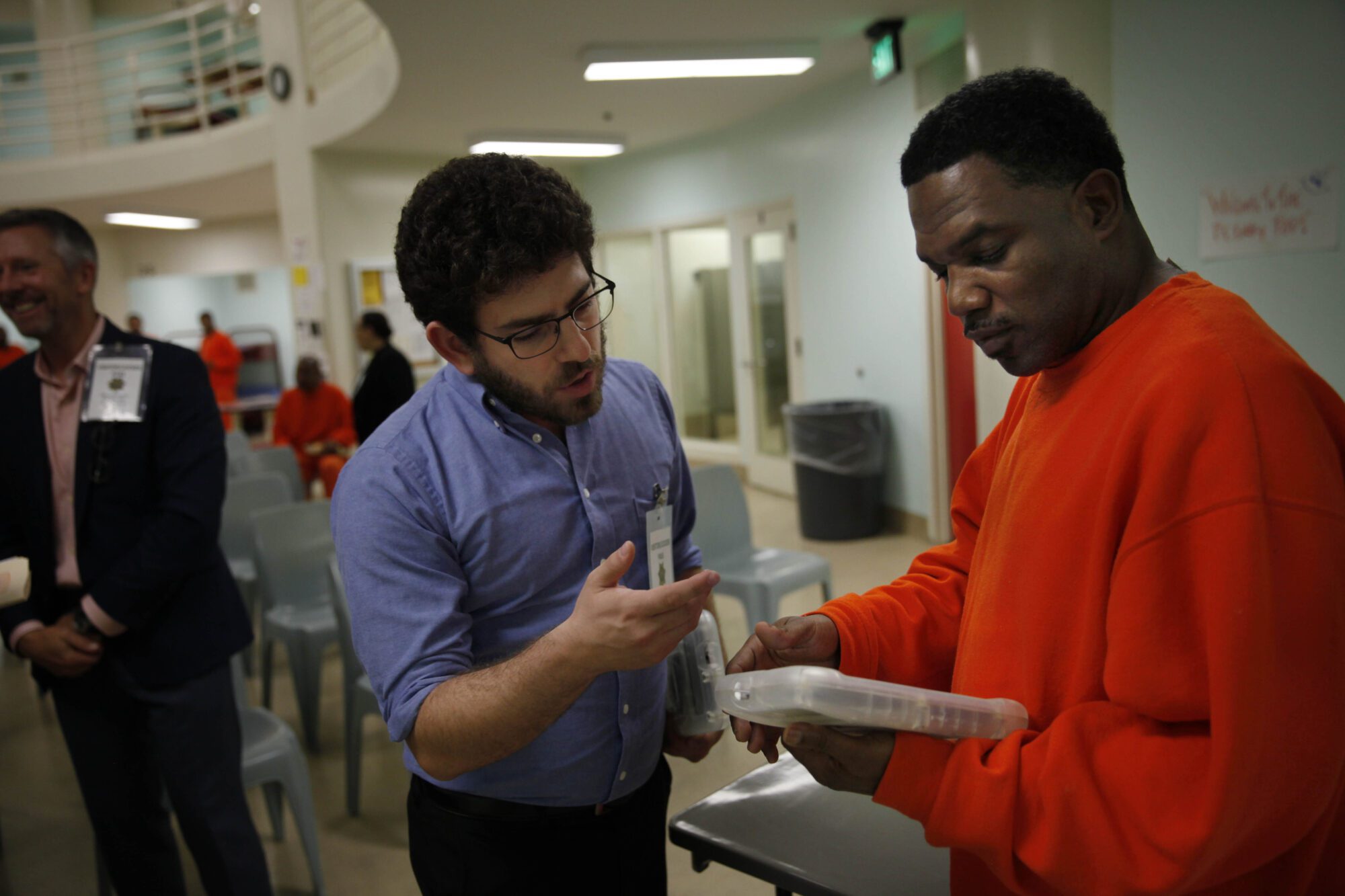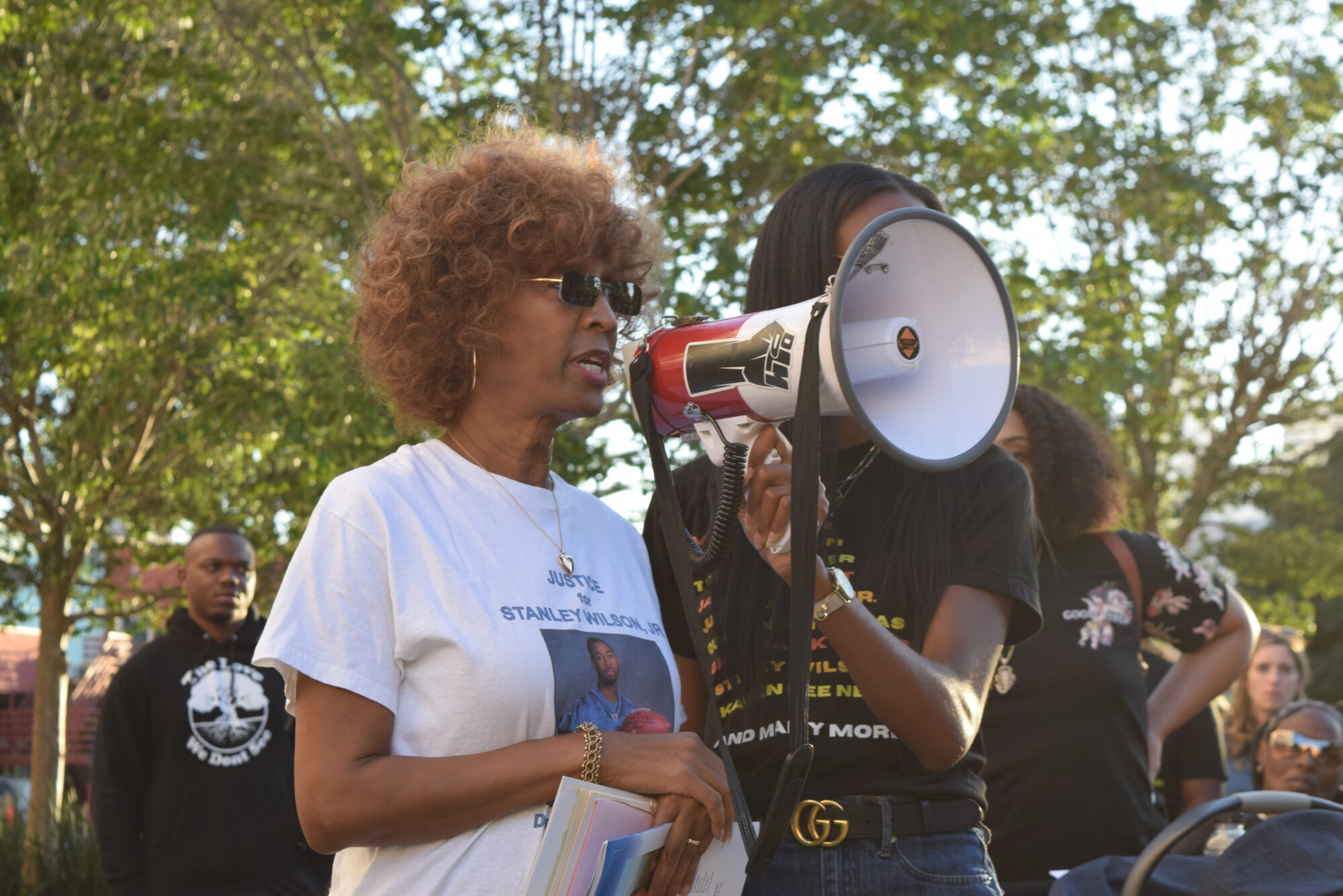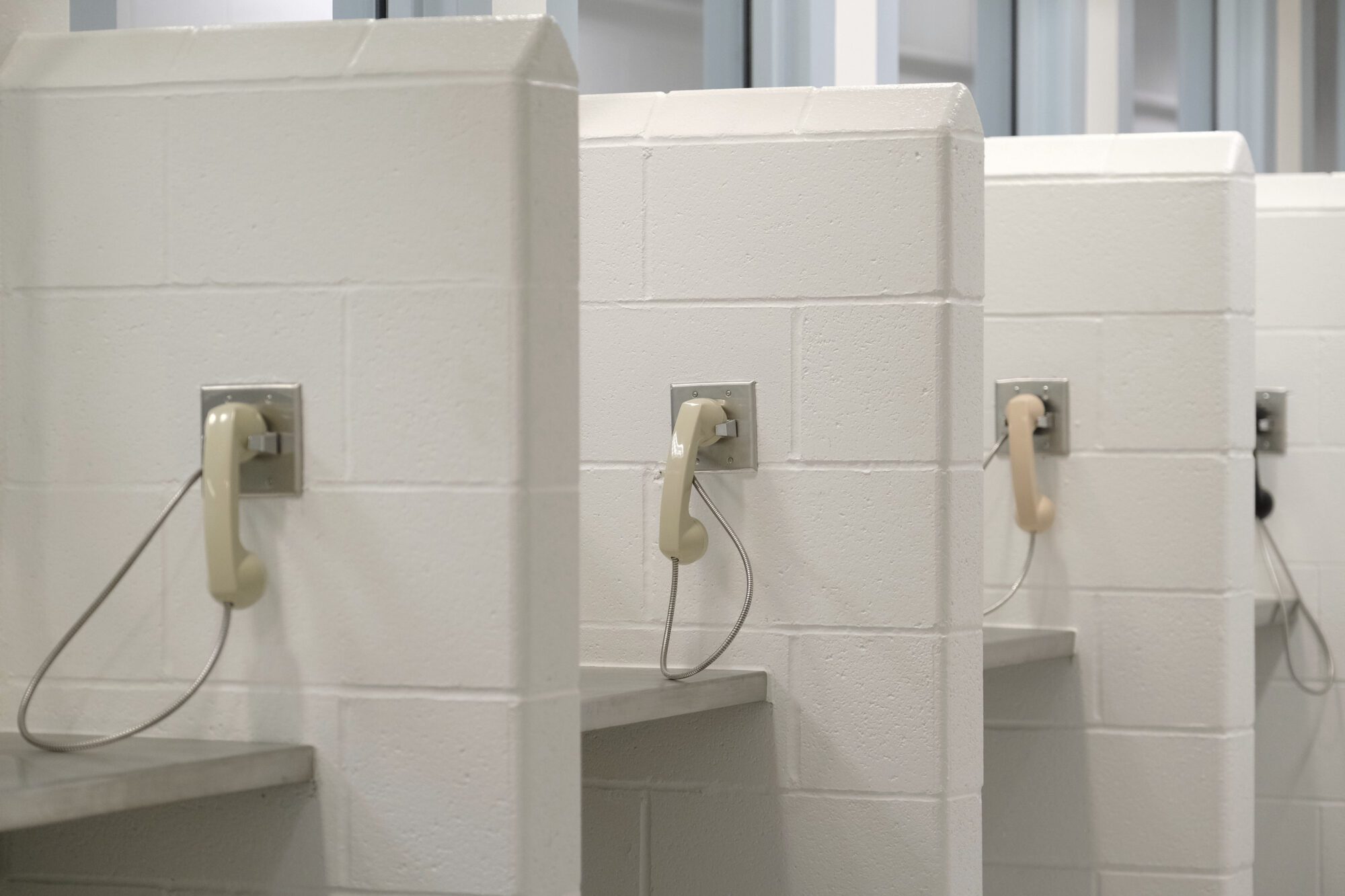San Francisco Expands Free Jail Communications by Adding Tablet Services
The move is part of a recent wave of jails and prisons starting to decouple carceral communications from a profit motive.
Kalena Thomhave | January 8, 2024


Rachel Kinnon has been bringing physical books to San Francisco County jails for nearly two decades as the jail and reentry services manager for the San Francisco Public Library. Before each visit, she’ll fill a book cart with popular titles, or perhaps specific books that inmates requested. But something special happened after the jails introduced a free tablet program to access media like eBooks, audiobooks, movies, TV shows, and music.
“People are talking about how life-changing it’s been inside to be able to make some choices about what they’re watching on TV, or what music they’re listening to—to be able to listen to music at all,” Kinnon said. Plus, incarcerated people have tens of thousands of choices within the free eBook and audiobook library, which contains more than 63,500 titles. Some inmates with vision issues can now read almost anything in large print, when they were previously limited to the small selection of large-print books. Other inmates with low levels of literacy take advantage of audiobooks to open up the world of books to them.
Media services like these are often offered in other jails, but as they’re typically controlled by for-profit prison telecom companies, they’re often exorbitantly expensive. In most places any form of communication used to keep incarcerated people connected to the outside world, be it phone calls or tablets, has also been used to control incarcerated populations and generate profits for jails and their contractors.
San Francisco has offered jail tablets and their content at no cost to incarcerated people, part of a wave of institutions starting to decouple carceral communications from a profit motive. The free tablet program was introduced in May of 2023, a logical follow-up to San Francisco making jail phone calls free in 2020, the first county in the country to do so and the second city after New York.
Before 2023, the San Francisco jails had never implemented any tablet program for all inmates. When the San Francisco Sheriff’s Department decided to dip its toes into providing the devices, Michelle Lau, the acting director of the Financial Justice Project within the San Francisco treasurer’s office, recalls that the very first iteration of the bid request was similar to others across the country—riddled with charges for tablet services.
She remembered thinking, “We just did this whole thing with jail phone calls—why are we doing basically the same thing on a tablet?” The San Francisco Jail Justice Coalition, a coalition of community groups, pushed for a completely free tablet program. “Some [community members] even said if there were any charges, they would prefer no tablet, rather than one with high charges,” Lau said.
Tablets have been trickling into prisons and jails over the past several years, with the devices first launched in 2012 by prison communications company JPay, now owned by prison telecom giant Securus. Soon prisons and jails began hailing “free” tablets for their inmates, as these companies would indeed often distribute tablets to inmates at no cost. But once incarcerated people actually used the tablets, they were far from free.
Music might be $1.99 per song, as it is for the most expensive songs in Washington State. In Pennsylvania state prisons, eBooks cost between $2.99 and $24.99. E-messaging can be as much as Arkansas’s $0.50 per message. Or, tablet costs may rack up based on how much the tablet is used; in Minnesota’s Fillmore County, tablet use costs $0.25 for each minute, which adds up to more than $30 to watch a typical movie on a tablet screen.
Meanwhile, most incarcerated people earn little money, if any, to pay for these services. As a result, families, many of whom are indigent themselves, may support them financially. And because of the disproportionate share of Black inmates in prisons and jails, much of these fees are paid by low-income Black women, either mothers or girlfriends or wives.
Over the past two and a half years, five states have made prison phone calls (though not necessarily jail phone calls) free. The latest one, Massachusetts, just passed a law in November. A handful of major cities in addition to San Francisco have also made jail phone calls free, including New York, Miami, Louisville, and Los Angeles.
Change will soon happen on the federal level, too. In early January 2023, President Biden signed the Martha Wright-Reed Just and Reasonable Communications Act of 2022, which allows the FCC to regulate in-state prison and jail phone calls as well as out-of-state phone calls. Under federal regulation, which is set to begin sometime in the latter half of 2024, the price of prison and jail phone calls nationwide will likely fall significantly.
In San Francisco, Sheriff Paul Miyamoto had already supported free phone calls, so it wasn’t surprising when his office ultimately released a request for proposals for a completely free tablet program. Alissa Riker, the sheriff’s office’s director of programs, said free tablets were “a long time coming” given the office’s “philosophy of not charging the folks in custody and their families.”
Lau says San Francisco received bids from the two major prison telecoms, Securus and ViaPath (formerly GTL) for the project. They also received one from Nucleos, a new company focused on prison education programming that seemed excited about a free tablet program. The company recently transitioned to a public benefit corporation, which requires it pursue both profits and positive social benefits.
In the end, Nucleos won the contract.
Most jails and prisons, however, are contracted with either Securus and ViaPath for their tablets. Together, the companies hold roughly 80 percent of the prison communications market valued at more than $1 billion. And Securus and ViaPath have been tracking the recent and growing trend toward free phone calls
“Some of the companies running jail phone calls, they see the writing on the wall” about the looming unprofitability of jail phone calls, said Joanna Weiss, co-executive director of the Fines and Fees Justice Center. “They are often making up the money through the use of tablets.”
In 2015, a Securus presentation to potential investors noted that the company has “successfully decreased its exposure” to new regulation by “investing in businesses that are not regulated.” These businesses are any number of ancillary services like e-messaging, eBooks, movies and TV show rentals, and music that the company can then charge inmates to use on a tablet. (The Martha Wright-Reed Act clarifies that the FCC may now regulate video calls.)
But companies aren’t the only ones that profit—prisons and jails can earn commissions on tablet services just as with phone calls. “We’re always looking for ways to bring in additional money to the county,” Pennsylvania’s Westmoreland County Jail Warden John Walton told the Pittsburgh Tribune-Review, commenting on the jail bringing in $161,000 in tablet commissions in 2019.
Riker, from the San Francisco sheriff’s office, noted that this is what sets San Francisco’s free program apart. “Money is why other sheriff’s offices aren’t doing it,” she said.
Typically, an institution’s profits from jail communications, whether via tablets or phones, are intended to fund inmate programming (though they sometimes simply shore up budgets or go to dubious purchases). Riker told Bolts that she’s gotten calls from people working at other jails who were astonished that San Francisco could afford to fund free tablets and give up that funding stream—regardless of the fact that the money is sourced from vulnerable prisoners and their families.
In 2023, the mayor’s office committed to using approximately $500,000 annually from the city’s general fund to support free tablet services for people in jail. As the San Francisco sheriff’s office’s annual budget is just under $300 million, the tablet program makes up roughly 0.2 percent of the department’s total budget.
The move has been part of a citywide shift away from prison profiteering. In 2020, San Francisco’s board of supervisors passed an ordinance to bar the city from profiting off of goods and services purchased by prisoners, which led to free jail phone calls as well as the end of markups on commissary items.
But even as tablets may be an important tool for people behind bars to connect with the outside world, carceral institutions also use them to replace in-person services like classes and visitation, and even to help better control a jail or prison population. Miami-Dade County jails, like many jails across the country, suspended in-person visitation during the initial months of the Covid-19 pandemic. But also like many other jails, Miami-Dade has yet to reinstate in-person visits almost four years later.
“Visitation right now is only video calls,” said Katherine Passley, the co-executive director of Beyond the Bars, a Miami activist group organizing families of incarcerated people and pushing for changes at the jails. Passley’s father is incarcerated at a Miami-Dade County jail. Even though the county offers free 15-minute video calls, the service itself is “horrible,” Passley said, not only because of Miami’s internet connection problems—the National Digital Inclusion Alliance ranked Miami one of the worst cities in the country for internet connectivity—but also because the video contract with ViaPath precludes the use of Apple iPhones for video calling. The vast majority of Beyond the Bar’s membership can’t even access video calls, she said.
As for prison programming, the sheriff’s office in San Francisco considers the tablets a supplement to in-person classes and programming and explicitly refuses to use them as a replacement. This is not necessarily the case in other jurisdictions, which may see tablet services as an affordable replacement for educational programming. Low staffing issues in South Carolina prisons partly inspired a tablet program with educational services so the state could “use technology to deliver services to these folks in their cells,” as Department of Corrections Director Bryan Stirling told the Greenville News.
Plus, many wardens have extolled the virtue of tablets for keeping incarcerated people busy—and keeping them under their thumbs. “It’s a great tool for us, because number one it keeps them occupied, but number two it’s something that we can take away from them for behavior modification purposes,” Pennsylvania’s Lackawanna County Jail Warden Tim Betti told The Scranton Times-Tribune in 2020.
In Miami, Beyond the Bars has concentrated on tackling fee elimination in the jails, following in the footsteps of San Francisco. For instance, they’ve successfully advocated for the county to get rid of a $2 daily fee that pushed inmates into debt and commit to providing free 90-minute phone calls each day for people in jail. The group is currently working to reintroduce in-person visitation in the jails to ensure that incarcerated people and their families aren’t only able to see their loved ones through a screen.
Beyond the Bars has also recently pushed for free tablet services in Miami-Dade County jails. The tablet program outlined in the county’s request for proposals is not quite as ambitious as San Francisco’s but is better than that of the vast majority of jails nationwide. When the Miami-Dade County jails implement the program, the plan is for inmates to get their own free tablets with access to a limited number of free resources, such as an eBook library and one free movie a month. More specific details of the tablet program, however, will likely be up to the as-of-yet unannounced contractor. Beyond the Bars reached out to the local public library, which has agreed to work with them similarly to the San Francisco library—but it’s unclear if the library will ultimately be part of the program.
Kinnon, the San Francisco librarian, said she’s fielded inquiries “every week or two” from libraries interested in replicating San Francisco’s model. But she notes most of these libraries are in jurisdictions contracted with Securus or ViaPath—companies that would have to give up their profits on books and music, unlike the newcomer Nucleos. Kinnon said that from what she understands, ViaPath and Securus “have not expressed any openness or interest in working with public libraries.” Kinnon mused that one possible, though clunky, workaround would be for carceral systems to offer two tablets, one with free library services and one with the telecom provider’s services.
Companies like ViaPath and Securus “need to feel pressure…to be more open to do this and make it work,” said Kinnon, adding that San Francisco and Nucleos needed to work together to find creative ways to make the free tablet project happen.
“But we did it,” she said. “And that means it could happen anywhere.”
Stay up-to-date
Support us
Bolts is a non-profit newsroom that relies on donations, and it takes resources to produce this work. If you appreciate our value, become a monthly donor or make a contribution.




